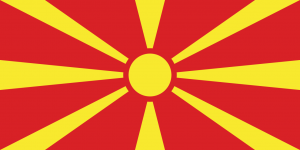Language/Macedonian/Grammar/Future-Tense
Hi Macedonian learners! 😊
In this lesson, we will focus on the future tense in the Macedonian language. The future tense is used to express actions that will happen in the future. It is important to understand the future tense to communicate effectively in Macedonian. Let's get started!
After mastering this lesson, these related pages might interest you: Adjectives: Agreement and Comparatives & Present Tense.
Future Tense Formations[edit | edit source]
The Macedonian language has two future tenses: the simple future tense and the future perfect tense. The simple future tense expresses actions that will happen in the future, while the future perfect tense expresses actions that will be completed in the future.
Simple Future Tense[edit | edit source]
The simple future tense is formed by adding the appropriate endings to the verb stem. The endings depend on the verb type. Below are the endings for each verb type:
| Verb Type | Infinitive Ending | Future Tense Endings | ||||||||||||
|---|---|---|---|---|---|---|---|---|---|---|---|---|---|---|
| -ам | -aти | -aм, -aш, -a, -ame, -ate, -aат | -ам | -и | -ам, -еш, -е, -еме, -ете, -ат | -ам | -eти | -aм, -аш, -a, -аме, -ате, -аат | -им | -и | -aam, -aash, -aa, -аame, -aate, -aат | -нам | -ати | -наам, -нааш, -на, -нааме, -наате, -наат |
Let's look at some examples:
- Јас ќе имам - I will have
- Ти ќе гледаш - You will watch
- Тој ќе се игра - He will play
- Ние ќе запаѓаме - We will fall
- Вие ќе играте - You (pl.) will play
- Тие ќе седат - They will sit
Future Perfect Tense[edit | edit source]
The future perfect tense is formed by using the future tense of the verb "имам" (to have) followed by the past participle of the main verb. The past participle in Macedonian is the same as the past tense form for regular verbs. For irregular verbs, the past participle must be memorized.
Below are some examples of the future perfect tense:
- Јас ќе имам говорено - I will have spoken
- Ти ќе имаш видено - You will have seen
- Тој ќе има направено - He will have done
- Ние ќе имаме кажано - We will have said
- Вие ќе имате прочитано - You (pl.) will have read
- Тие ќе имаат донесено - They will have brought
Usage of the Future Tense[edit | edit source]
The future tense is used to talk about actions that will take place in the future. It is commonly used when making plans or predictions about what will happen. It is also used to express hopes and expectations.
Here are some examples:
- Оваа сабота, јас ќе патувам до Битола. (This Saturday, I will travel to Bitola.)
- Ќе порастам и ќе станам лекар. (I will grow up and become a doctor.)
- Можеби ќе ве видаме на вечера? (Perhaps we will see you at dinner?)
Examples in Context[edit | edit source]
Here is a sample dialogue to illustrate the future tense in context:
- Person 1: Што планирате да правите овие лето? (What are your plans for this summer?)
- Person 2: Слушам убави работи за Берово, можеби ќе отам. (I've heard good things about Berovo, maybe I will go there.)
- Person 1: Тоа ќе биде одлично! (That will be great!)
Cultural Notes[edit | edit source]
The Macedonian language is strongly tied to the culture and history of the country. Understanding the Macedonian language is an important aspect of appreciating Macedonian culture. Macedonia has a rich literary tradition, with many famous poets and authors. Some well-known Macedonian writers include Kočo Racin, Blaze Koneski, and Slavko Janevski.
Practice, Practice, Practice![edit | edit source]
To improve your use of the future tense in Macedonian, it is important to practice speaking and writing in context. You can find native speakers on the Polyglot Club website. Find native speakers and ask them any questions!
Sources[edit | edit source]
➡ If you have any questions, please ask them in the comments section below.
➡ Feel free to edit this wiki page if you think it can be improved. 😎
Other Lessons[edit | edit source]
- Give your Opinion
- Pronouns
- Feminine
- Articles
- Conditional Mood
- Adverbs
- How to Use Be
- Plurals
- Nouns
- Negation

